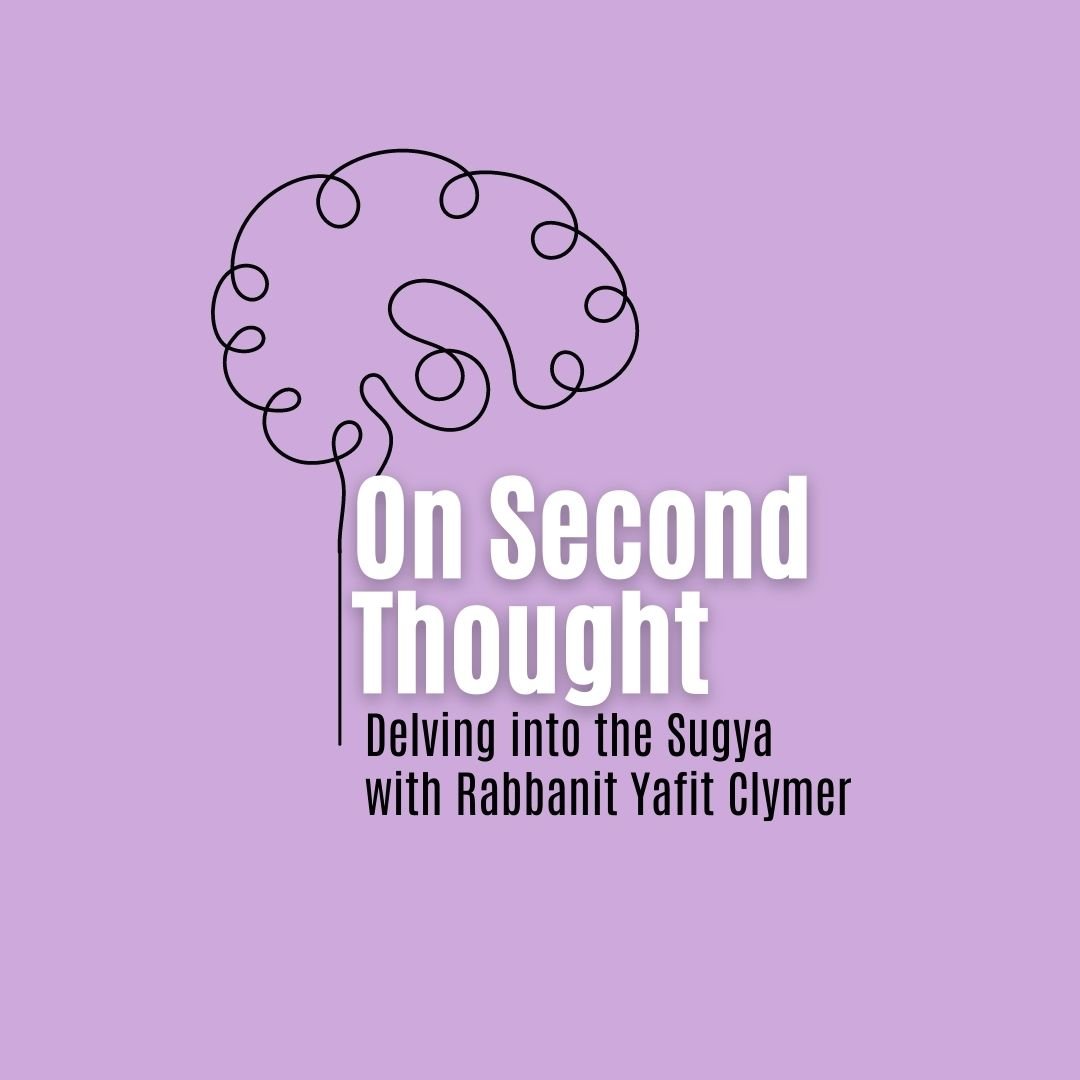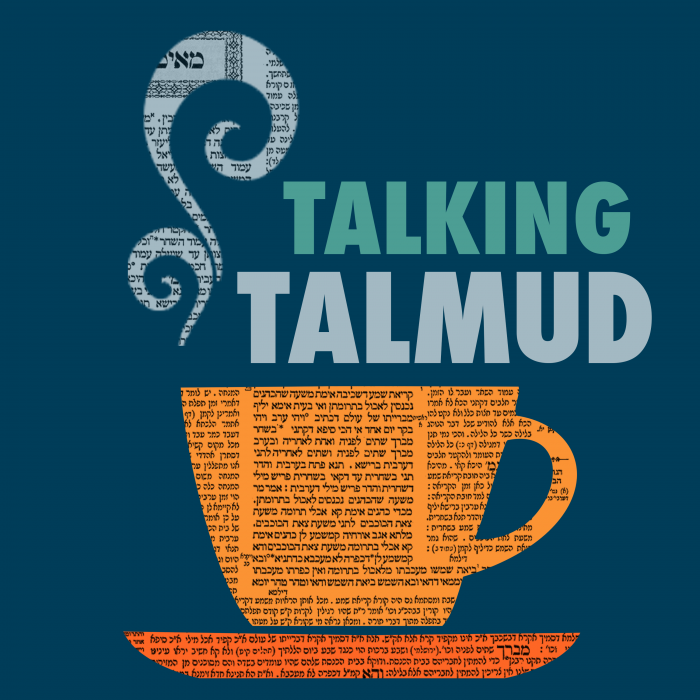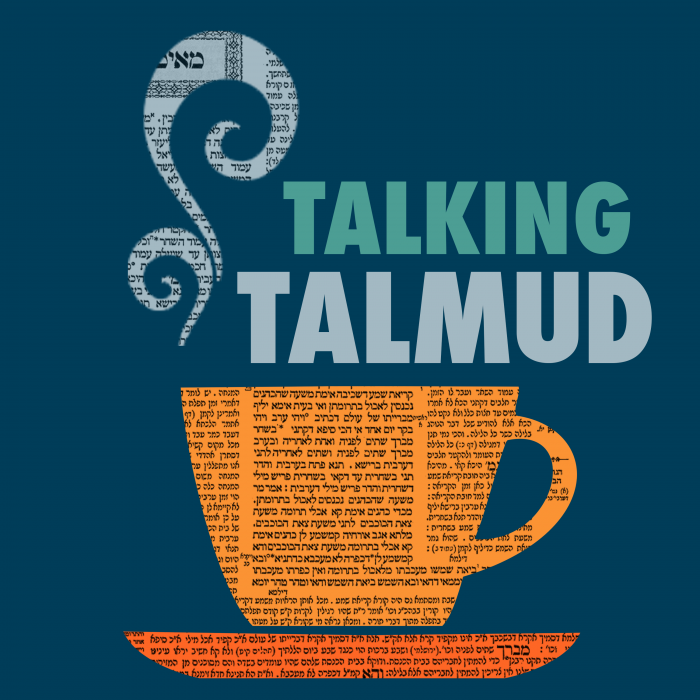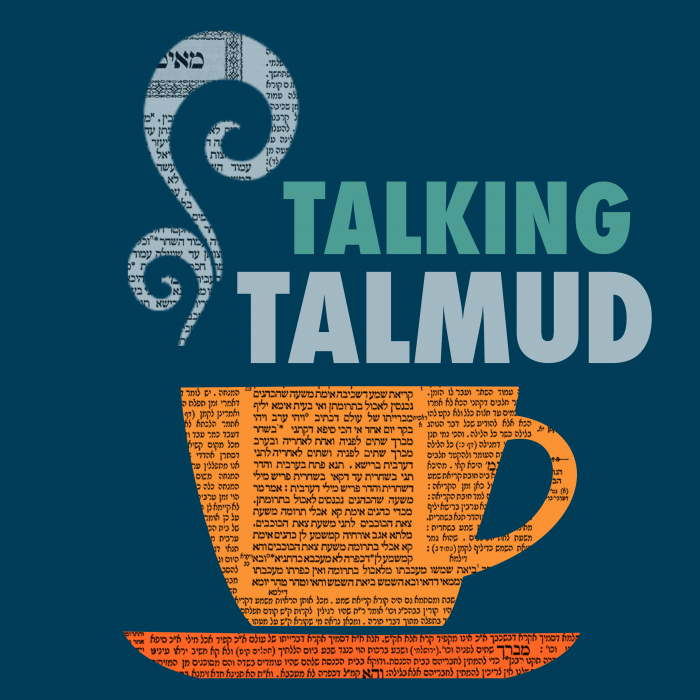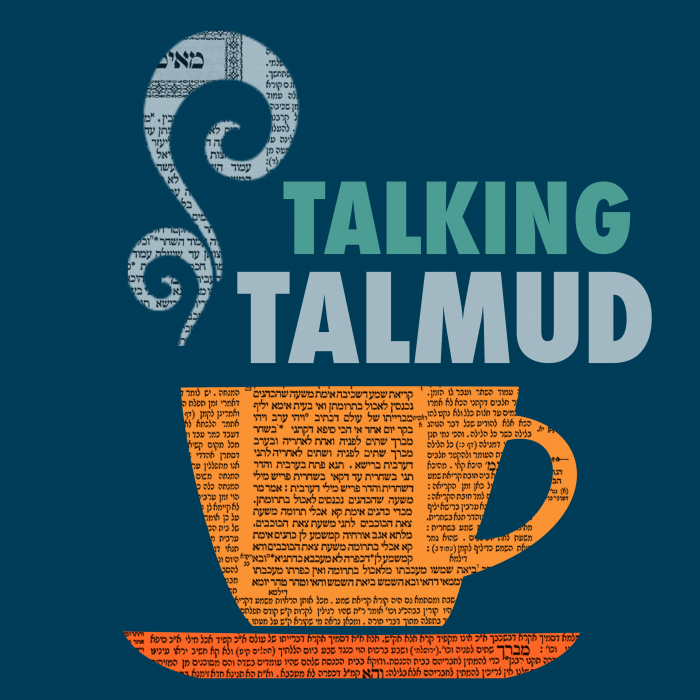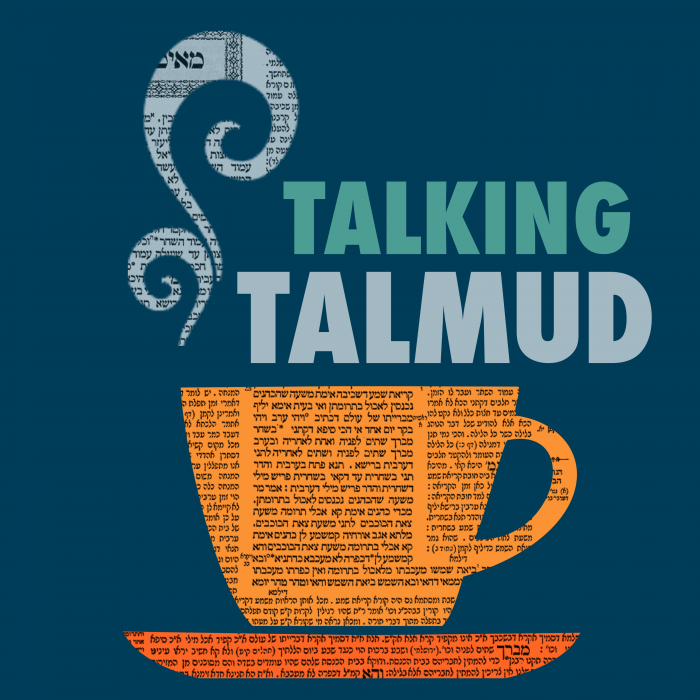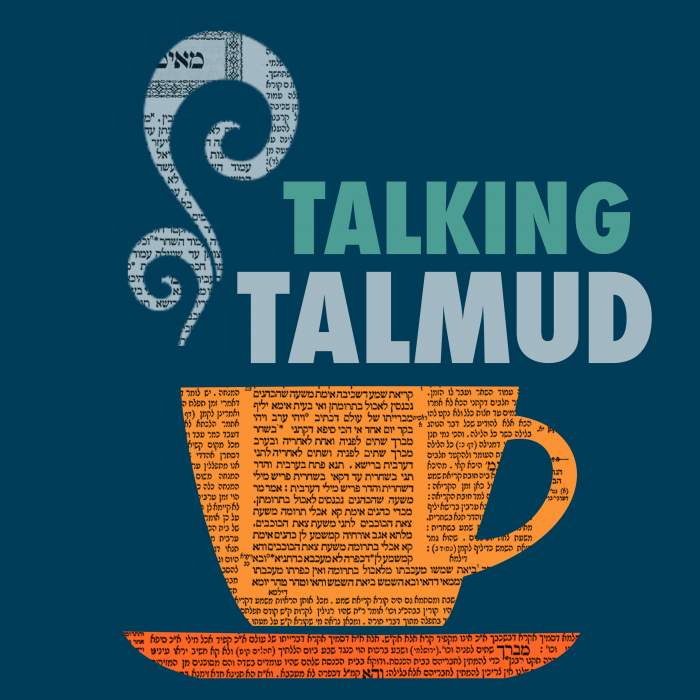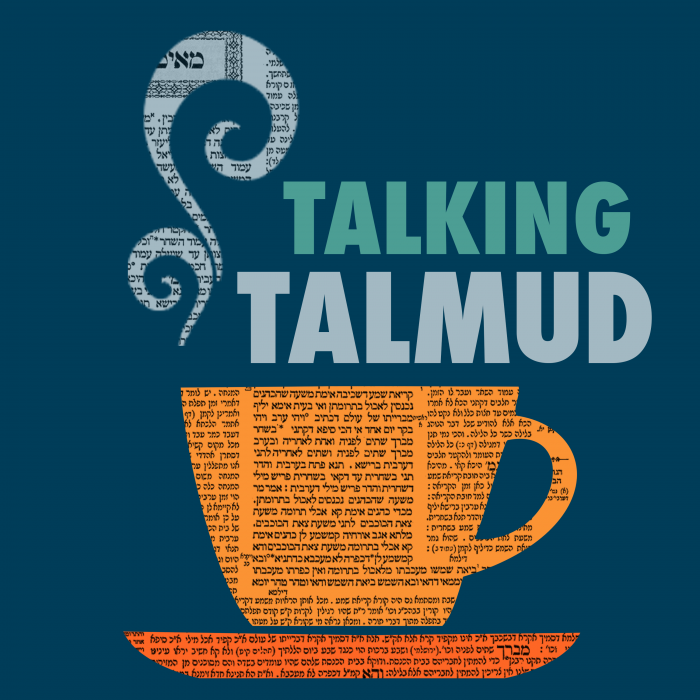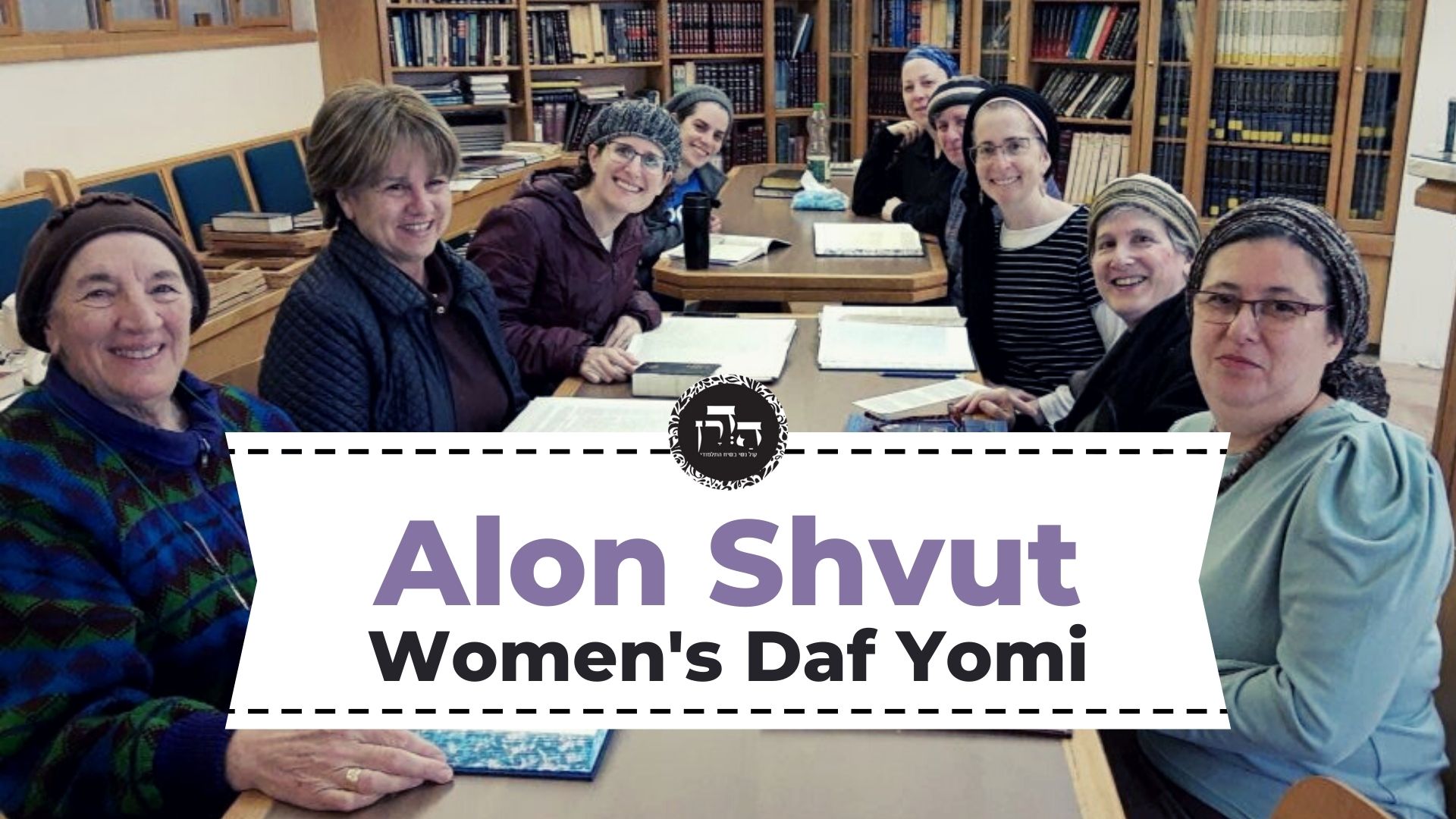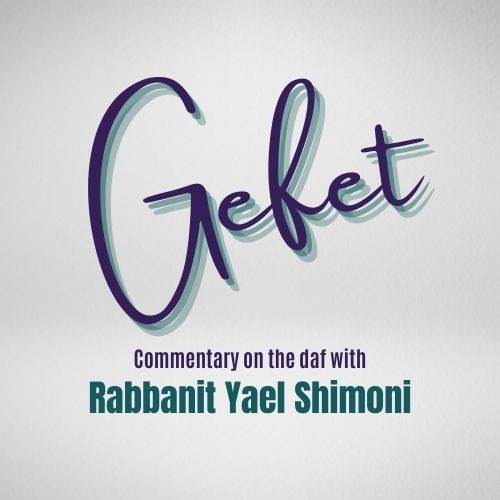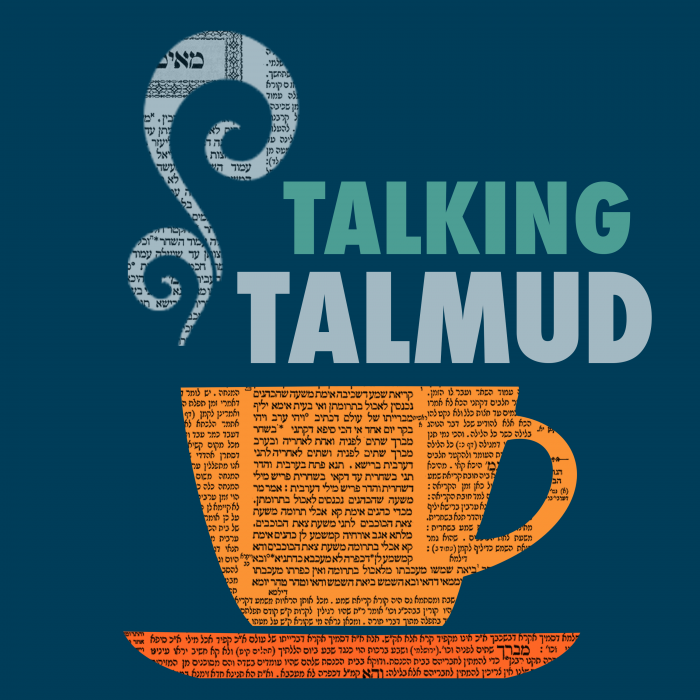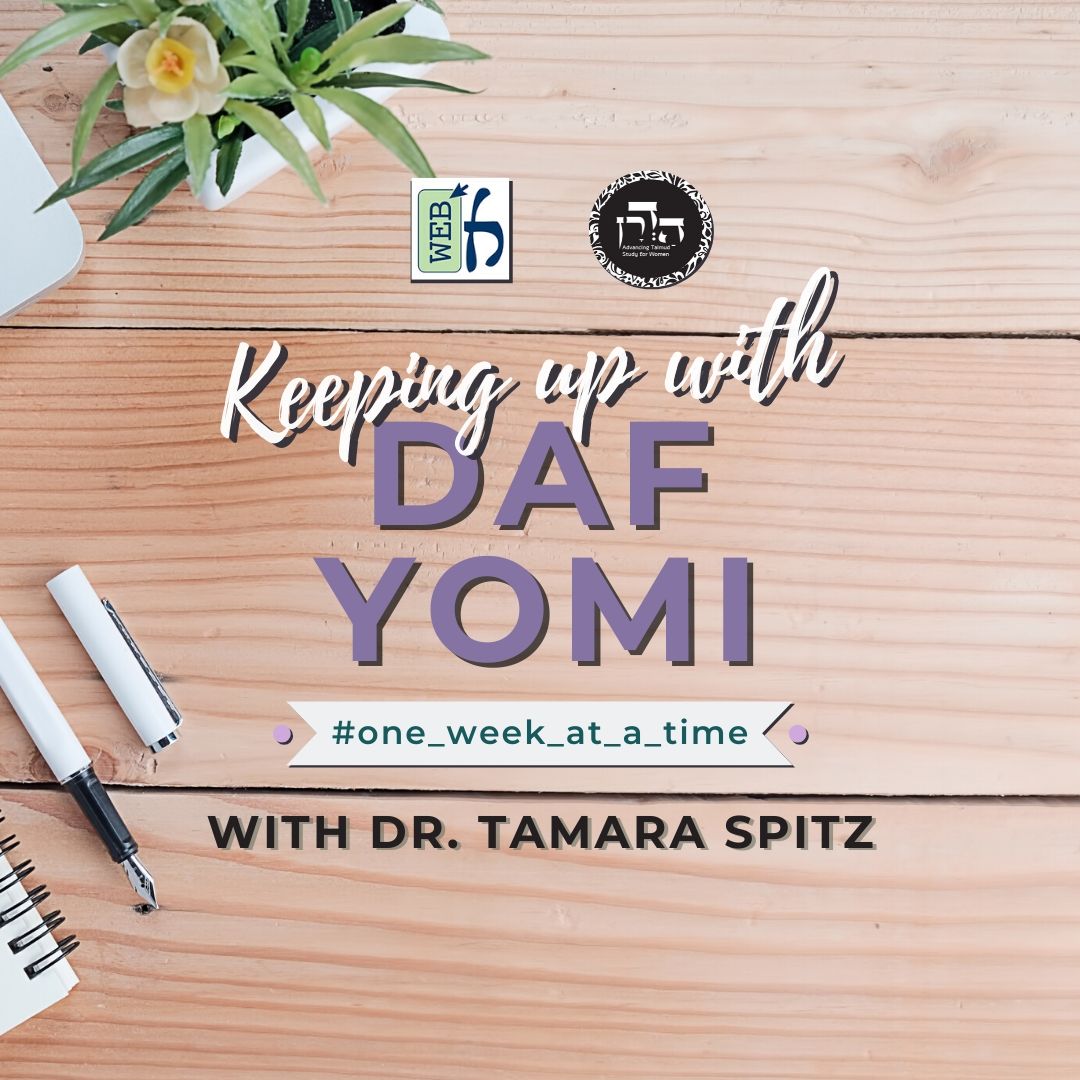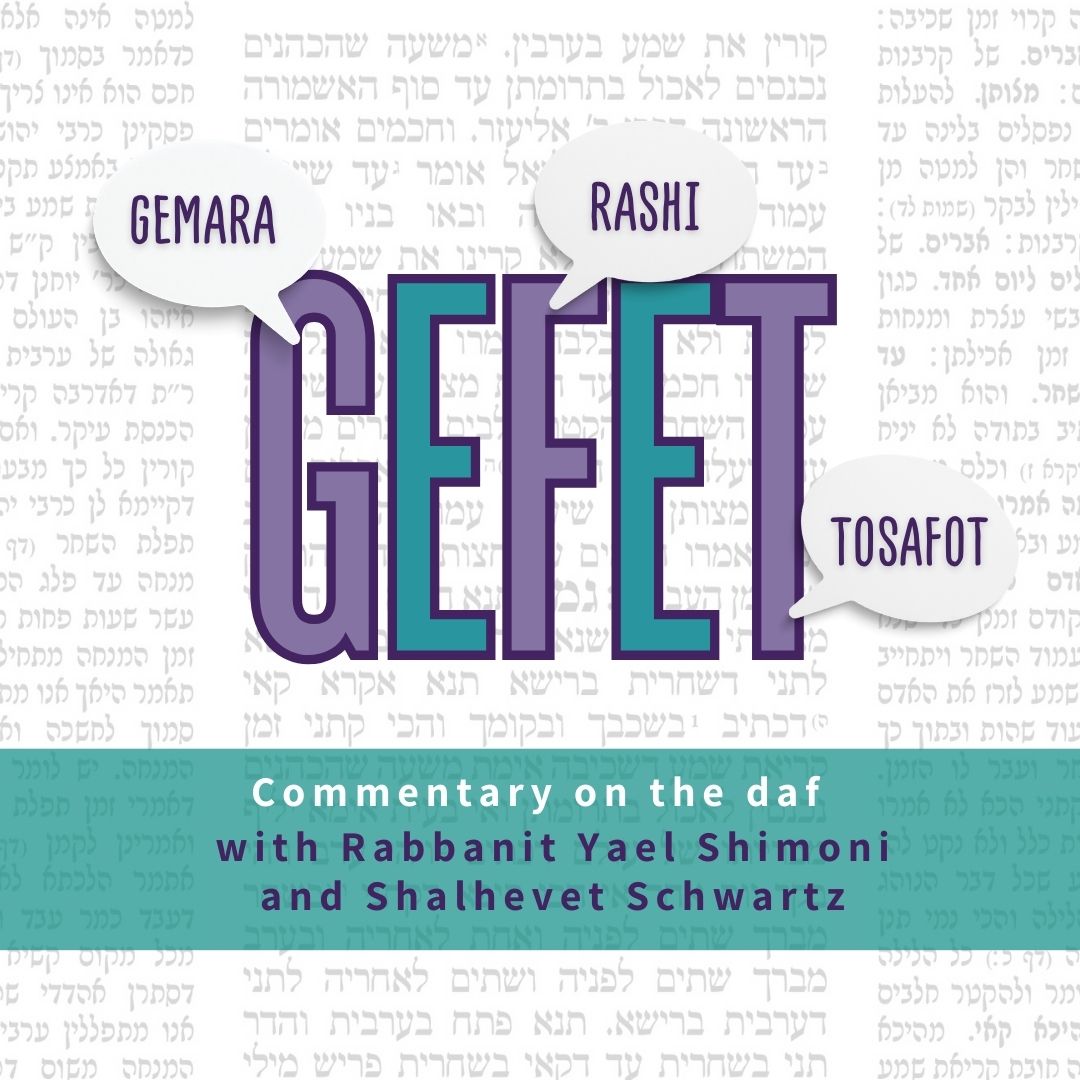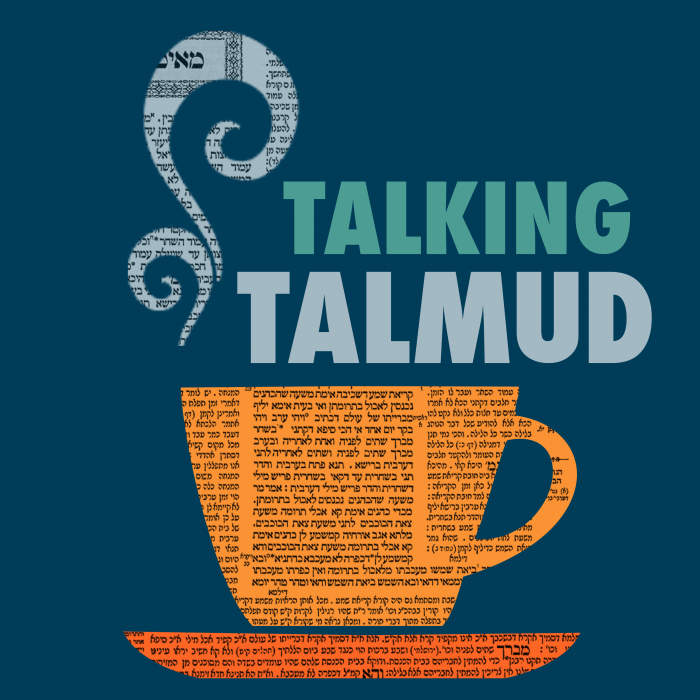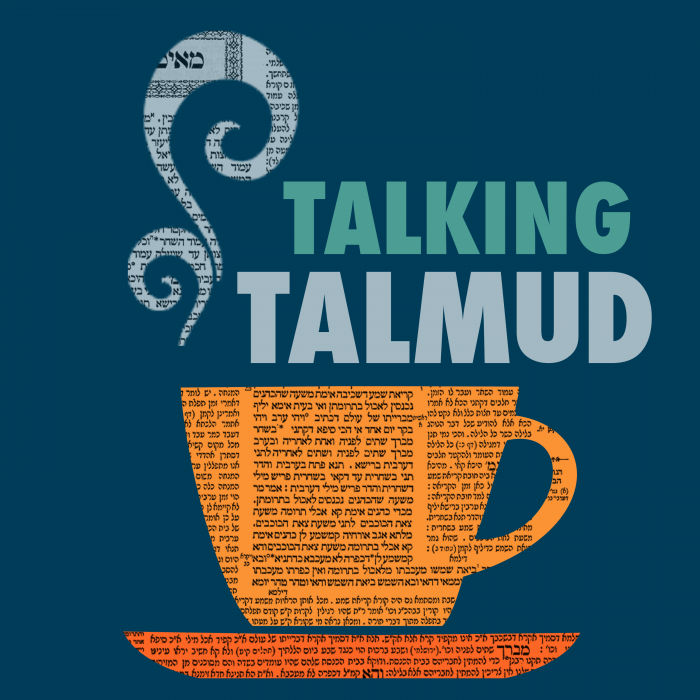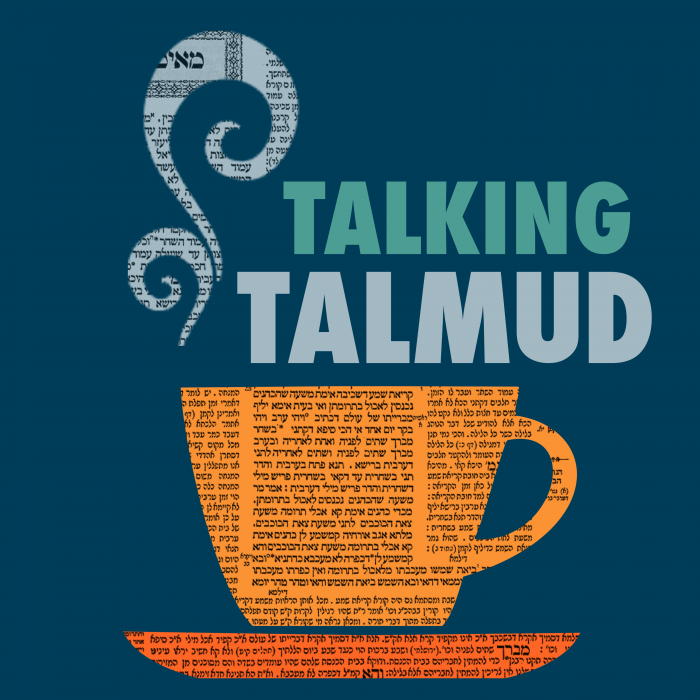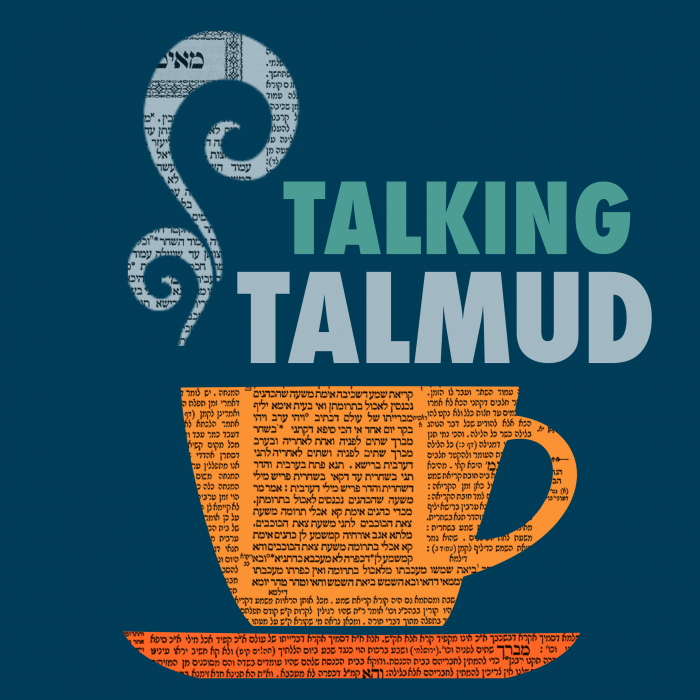What are the differences between regular forbidden sexual relations and an esoused maidservant? What exactly is an espoused maidservant – is she half free and half enslaved or fully enslaved. Is the man who slept with her a Jew or a Canaanite slave? How does each opinion explain the unclear verse describing the situation of one who engages in sexual relations with her? What is her punishment? If one is a minor or asleep, or the only began sexual relations but didn’t finish or engaged in anal intercourse, are they obligated? How does one become obligated to bring a sin offering in a case where one doesn’t know that one sinned – what type of testimmony is necessary? What if one denies the testimony against him/her or a witness denies another witness? There is a problem with the first line of the mishna in light of the continuation of the mishna. The gemara brings two explanations.
This week’s learning is sponsored for the merit and safety of Haymanut (Emuna) Kasau, who was 9 years old when she disappeared from her home in Tzfat two years ago, on the 16th of Adar, 5784 (February 25, 2024), and whose whereabouts remain unknown.
This week’s learning is dedicated of the safety of our nation, the soldiers and citizens of Israel, and for the liberation of the Iranian people. May we soon see the realization of “ליהודים היתה אורה ושמחה וששון ויקר”.
This week’s learning is sponsored for the merit and safety of Haymanut (Emuna) Kasau, who was 9 years old when she disappeared from her home in Tzfat two years ago, on the 16th of Adar, 5784 (February 25, 2024), and whose whereabouts remain unknown.
Want to dedicate learning? Get started here:


Today’s daily daf tools:
This week’s learning is sponsored for the merit and safety of Haymanut (Emuna) Kasau, who was 9 years old when she disappeared from her home in Tzfat two years ago, on the 16th of Adar, 5784 (February 25, 2024), and whose whereabouts remain unknown.
This week’s learning is dedicated of the safety of our nation, the soldiers and citizens of Israel, and for the liberation of the Iranian people. May we soon see the realization of “ליהודים היתה אורה ושמחה וששון ויקר”.
This week’s learning is sponsored for the merit and safety of Haymanut (Emuna) Kasau, who was 9 years old when she disappeared from her home in Tzfat two years ago, on the 16th of Adar, 5784 (February 25, 2024), and whose whereabouts remain unknown.
Today’s daily daf tools:
Delve Deeper
Broaden your understanding of the topics on this daf with classes and podcasts from top women Talmud scholars.
New to Talmud?
Check out our resources designed to help you navigate a page of Talmud – and study at the pace, level and style that fits you.
The Hadran Women’s Tapestry
Meet the diverse women learning Gemara at Hadran and hear their stories.
Keritot 11
שֶׁעָשָׂה בָּהּ אֶת הַמֵּזִיד כַּשּׁוֹגֵג.
That the Torah established her status so that the one who engages in intercourse with her intentionally is like the one who does so unwittingly, as both are liable to bring a guilt offering, whereas one who engages in intercourse with those with whom relations are forbidden is liable to bring a sin offering only when he does so unwittingly.
אֵיזוֹ שִׁפְחָה? כֹּל שֶׁחֶצְיָהּ שִׁפְחָה וְחֶצְיָהּ בַּת חוֹרִין, שֶׁנֶּאֱמַר: ״וְהׇפְדֵּה לֹא נִפְדָּתָה״, דִּבְרֵי רַבִּי יְהוּדָה. רַבִּי יִשְׁמָעֵאל אוֹמֵר: זוֹ הִיא שִׁפְחָה וַדָּאִית. רַבִּי אֱלִיעֶזֶר בֶּן יַעֲקֹב אוֹמֵר: כׇּל עֲרָיוֹת מְפוֹרָשׁוֹת, וְשִׁיּוּר אֵין לָנוּ אֶלָּא חֶצְיָהּ שִׁפְחָה וְחֶצְיָהּ בַּת חוֹרִין.
Who is the espoused maidservant in question? It is any woman who is half-maidservant half-free woman, i.e., a maidservant who belonged to two masters, one of whom liberated her, as it is stated: “And she was redeemed and not redeemed” (Leviticus 19:20), which means that she was partially but not completely redeemed. This is the statement of Rabbi Yehuda. Rabbi Yishmael says: An espoused maidservant is a full-fledged maidservant whose status is certain, as the language of the verse does not mean redeemed and not redeemed; it is simply a way of stating that she was not redeemed. Rabbi Eliezer ben Ya’akov says: All those with whom relations are forbidden are enumerated in the Torah, and we have no exception other than one who is half-maidservant half-free woman.
גְּמָ׳ מְנָלַן דְּהִיא לָקְיָ[א] וְהוּא לָא לָקֵי? דְּתָנוּ רַבָּנַן: ״בִּקּוֹרֶת תִּהְיֶה״ – מְלַמֵּד שֶׁהִיא לוֹקָה. יָכוֹל שְׁנֵיהֶן לוֹקִין? תַּלְמוּד לוֹמַר: ״תִּהְיֶה״ – הִיא לוֹקֶה וְהוּא אֵינוֹ לוֹקֶה.
GEMARA: The mishna teaches that in the case of an espoused maidservant the Torah did not equate the man with the woman. The Gemara asks: From where do we derive that she is flogged and that he is not flogged? As the Sages taught in a baraita: The verse states: “And if a man lies carnally with a woman, and she is a maidservant designated for a man…there shall be an inspection [bikkoret tihye]” (Leviticus 19:20). This teaches that she is flogged. And as one might have thought that both are flogged, the verse states: “There shall be [tihye],” in the feminine, to teach that she is flogged and he is not flogged.
וּמִנַּיִן דְּהָדֵין ״בִּקּוֹרֶת״ לִישָּׁנָא דְּמַלְקוּת הוּא? אָמַר רַבִּי יִצְחָק: ״תְּהֵא בֵּקָרָאֵי״, כִּדְתַנְיָא: גְּדוֹל הַדַּיָּינִין מַקְרִא, שֵׁנִי מוֹנֶה, שְׁלִישִׁי אוֹמֵר: הַכֵּהוּ. רַב אָשֵׁי אוֹמַר: ״בְּבִיקּוּר תִּהְיֶה״, כְּדִתְנַן: אֵין אוֹמְדִין אוֹתוֹ אֶלָּא מַכּוֹת הָרְאוּיוֹת לְהִשְׁתַּלֵּשׁ.
And from where is it derived that this word inspection [bikkoret] is a term for flogging? Rabbi Yitzḥak said: It indicates that she shall be subjected to the reciting of [bikra’ei] the verses, as it is taught in a baraita: The procedure for administering lashes is that before each lash is administered, the eldest or most prominent of the three judges recites the relevant verses in the Torah; the second-eldest one counts the lashes; and the third says to the attendant: Strike him. Rav Ashi says that it indicates that she shall be subject to an assessment [bikkur], as we learned in a mishna (Makkot 22a): One assesses the number of lashes that the one sentenced to be flogged is capable of withstanding, but only by a number of lashes fit to be divided by three. This teaches that the assessment is an essential part of the flogging procedure.
תָּנוּ רַבָּנַן: בִּזְמַן שֶׁהָאִשָּׁה לוֹקָה – הָאִישׁ מֵבִיא קׇרְבָּן, אֵין הָאִשָּׁה לוֹקָה – אֵין הָאִישׁ מֵבִיא קׇרְבָּן. מְנָלַן? אָמַר רָבָא, דִּכְתִיב: ״וְאִישׁ כִּי יִשְׁכַּב אֶת אִשָּׁה שִׁכְבַת זֶרַע וְהִיא שִׁפְחָה נֶחֱרֶפֶת לְאִישׁ וְהׇפְדֵּה לֹא נִפְדָּתָה אוֹ חוּפְשָׁה לֹא נִתַּן לָהּ״.
The Sages taught in a baraita: At the time that, i.e., in any case where, the woman is flogged, the man brings an offering. In a case where the woman is not flogged, the man does not bring an offering. The Gemara asks: From where do we derive this? Rava said that it is as it is written: “And if a man lies carnally with a woman, and she is a maidservant designated for a man, and not at all redeemed, nor was freedom given her; there shall be an inspection…He shall bring his guilt offering unto the Lord” (Leviticus 19:20–21).
מִכְּדִי עַד הָכָא בְּאִישׁ קָא מִשְׁתַּעֵי קְרָא, נִכְתּוֹב: ״וְהֵבִיא אֶת אֲשָׁמוֹ לַה׳״, וּלְבַסּוֹף לִכְתּוֹב ״בִּקּוֹרֶת תִּהְיֶה״. אַמַּאי כְּתַב רַחֲמָנָא בְּרֵישָׁא: ״בִּקּוֹרֶת תִּהְיֶה״ וּלְבַסּוֹף כְּתַב: ״וְהֵבִיא אֶת אֲשָׁמוֹ לַה׳״? הָכִי קָאָמַר: אִם בִּקּוֹרֶת תִּהְיֶה הִיא – ״וְהֵבִיא אֶת אֲשָׁמוֹ לַה׳״, וְאִם לֹא תִּהְיֶה בִּקּוֹרֶת – לֹא יָבִיא הוּא אֶת אֲשָׁמוֹ.
The Gemara explains: Since until here, the verse is dealing with a man, let it first write: “He shall bring his guilt offering unto the Lord,” and at the end let it write: “There shall be an inspection.” Why did the Merciful One first write: “There shall be an inspection,” and at the end write: “He shall bring his guilt offering unto the Lord”? The Gemara explains that this is what the verse is saying: If there will be an inspection, meaning that the woman is to be flogged, then “he shall bring his guilt offering unto the Lord.” But if there will not be an inspection, then he shall not bring his guilt offering.
אֵימָא, הוּא מַעֲטֵיהּ קְרָא, אֲבָל הִיא תִּילְקֵי וְתַיְתֵי קׇרְבָּן! – ״וְהֵבִיא אֶת אֲשָׁמוֹ לַה׳״ כְּתִיב.
The Gemara objects: You can say that the verse in fact excludes him from being flogged due to the use of the term “there shall be,” thereby limiting his liability to bring a guilt offering; but even so, she should be flogged and also bring an offering. The Gemara explains: “He shall bring his guilt offering unto the Lord,” is written in the verse, instead of merely: He shall bring a guilt offering. This teaches that only he, and not she, brings a guilt offering.
אָמַר רַבִּי יִצְחָק: לְעוֹלָם אֵינוֹ חַיָּיב אֶלָּא עַל שִׁפְחָה בְּעוּלָה בִּלְבָד, שֶׁנֶּאֱמַר: ״וְהִיא שִׁפְחָה נֶחֱרֶפֶת לְאִישׁ״. וּמַאי מַשְׁמַע, דְּהַאי ״נֶחֱרֶפֶת״ לִישָּׁנָא דְּשַׁנּוֹיֵי הוּא? דִּכְתִיב ״וַתִּשְׁטַח עָלָיו הָרִיפוֹת״. וְאִי בָּעֵית אֵימָא: ״אִם תִּכְתּוֹשׁ הָאֱוִיל בַּמַּכְתֵּשׁ בְּתוֹךְ הָרִיפוֹת בַּעֱלִי״.
Rabbi Yitzḥak says: Actually, he is liable only in a case where he engages in intercourse with a non-virgin maidservant, as it is stated: “And she is a maidservant designated [neḥerefet] for a man.” And from where may it be inferred that this word “designated [neḥerefet],” is a term of change, i.e., that she has already changed from her status as a virgin to that of a non-virgin? Rabbi Yitzḥak explains: As it is written: “And strewed groats [harifot] thereon” (II Samuel 17:19). Since groats are grains that have been crushed or otherwise changed from their original form, the linguistic correlation between harifot and neḥerefet indicates that both terms are referring to some form of change. And if you wish, say that it is inferred from the verse: “Though you should bray a fool in a mortar with a pestle among groats [harifot]” (Proverbs 27:22).
״וַיִּתְּנוּ יָדָם לְהוֹצִיא נְשֵׁיהֶם וַאֲשֵׁמִים אֵיל צֹאן עַל אַשְׁמָתָם״, אָמַר רַב חִסְדָּא: מְלַמֵּד שֶׁכּוּלָּן שְׁפָחוֹת חֲרוּפוֹת בָּעֲלוּ.
It is stated in another verse: “And among the sons of the priests there were found some that had married foreign women, namely: Of the sons of Jeshua, son of Jozadak, and his brethren, Maaseiah, and Eliezer, and Jarib, and Gedaliah. And they gave their hand that they would divorce their wives; and being guilty, a ram of the flock for their guilt” (Ezra 10:18–19). Rav Ḥisda said: This teaches that they had all engaged in intercourse with espoused maidservants, as guilt offerings are brought for engaging in intercourse only with an espoused maidservant.
אֵיזוֹהִי שִׁפְחָה כּוּ׳. תָּנוּ רַבָּנַן: ״וְהׇפְדֵּה״, יָכוֹל כּוּלָּהּ? תַּלְמוּד לוֹמַר: ״לֹא נִפְדָּתָה״. יָכוֹל לֹא נִפְדָּתָה? תַּלְמוּד לוֹמַר: ״וְהׇפְדֵּה״,
§ The mishna teaches: Which is the espoused maidservant? According to Rabbi Yehuda, it is any woman who is half-maidservant and half-free woman, whereas Rabbi Yishmael maintains that it is referring to a full-fledged maidservant. In relation to this dispute, the Sages taught in a baraita that deals with the verse: “And she was redeemed” (Leviticus 19:20): One might have thought that this means she was entirely redeemed. Therefore, the verse states: “And she was redeemed and not redeemed,” to teach that she was not entirely redeemed. If so, one might have thought that she was not redeemed at all. Therefore, the verse states: “And she was redeemed,” to teach that it is discussing a maidservant who was partially redeemed.
הָא כֵיצַד? פְּדוּיָה וְאֵינָהּ פְּדוּיָה – חֶצְיָהּ שִׁפְחָה וְחֶצְיָיהּ בַּת חוֹרִין וּמְאוֹרֶסֶת לְעֶבֶד עִבְרִי, דִּבְרֵי רַבִּי עֲקִיבָא. רַבִּי יִשְׁמָעֵאל אוֹמֵר: בְּשִׁפְחָה כְּנַעֲנִית הַכָּתוּב מְדַבֵּר, וּמְאוֹרֶסֶת לְעֶבֶד עִבְרִי. אִם כֵּן מָה תַּלְמוּד לוֹמַר: ״וְהׇפְדֵּה לֹא נִפְדָּתָה״? דִּבְּרָה תוֹרָה כִלְשׁוֹן בְּנֵי אָדָם.
The baraita asks: How so? The baraita answers: The verse is referring to a maidservant who was both redeemed and not redeemed, as half of her is a maidservant owned by one master who did not redeem her, and half of her is a free woman, as the partner who previously owned the other half of her has freed her, and she is betrothed to a Hebrew slave. This is the statement of Rabbi Akiva. Rabbi Yishmael says that the verse is speaking of a Canaanite maidservant who was not redeemed at all and who is engaged to a Hebrew slave. If so, why must the verse state: “And she was redeemed and not redeemed”? The repetition is not halakhically significant; it is there because the Torah spoke in the language of people, and the phrase simply means: And she was not at all redeemed.
רַבִּי אֶלְעָזָר בֶּן עֲזַרְיָה אוֹמֵר: כׇּל עֲרָיוֹת מְפוֹרָשׁוֹת לָנוּ, מְשׁוּיָּיר לָנוּ חֶצְיָהּ שִׁפְחָה וְחֶצְיָהּ בַּת חוֹרִין וּמְאוֹרֶסֶת לְעֶבֶד עִבְרִי. אֲחֵרִים אוֹמְרִים: ״לֹא יוּמְתוּ כִּי לֹא חוּפָּשָׁה״ – בְּשִׁפְחָה כְּנַעֲנִית הַכָּתוּב מְדַבֵּר, וּמְאוֹרֶסֶת לְעֶבֶד כְּנַעֲנִי.
Rabbi Elazar ben Azarya says: All those with whom relations are forbidden are enumerated for us explicitly in the Torah. The only case which is excluded for us from that generalization is a half-maidservant half-free woman who is betrothed to a Hebrew slave. And Aḥerim say that when it states: “They shall not be put to death because she was not free,” the verse is speaking about a Canaanite maidservant who is betrothed to a Canaanite slave.
לְרַבִּי יִשְׁמָעֵאל, בִּשְׁלָמָא ״וְהׇפְדֵּה לֹא נִפְדָּתָה״ – כִּדְקָתָנֵי: דִּבְּרָה תּוֹרָה כִלְשׁוֹן בְּנֵי אָדָם, אֶלָּא דְּקָתָנֵי: מְאוֹרֶסֶת לְעֶבֶד עִבְרִי, מְנָלַן? דִּכְתִיב: ״כִּי לֹא חוּפָּשָׁה״, מִכְּלָל דְּהוּא חוּפַּשׁ.
The Gemara objects: According to Rabbi Yishmael, granted that the phrase “and she was redeemed and not redeemed” is referring simply to a Canaanite maidservant, as it is taught in the baraita: The Torah spoke in the language of people. But from where do we derive that which is taught, i.e., that she is betrothed specifically to a Hebrew slave? The Gemara explains that it is as it is written: “They shall not be put to death, because she was not free” (Leviticus 19:20). By inference, it may be concluded that he, the man to whom she is betrothed, is free. A Hebrew slave is not the property of his owner, but is merely obligated to serve him for a period of time.
רַבִּי אֶלְעָזָר בֶּן עֲזַרְיָה הַיְינוּ רַבִּי עֲקִיבָא! לְרַבִּי יִשְׁמָעֵאל קָאָמַר: לְדִידִי, בְּעָלְמָא כְּווֹתָיךְ סְבִירָא לֵיהּ דְּדִבְּרָה תוֹרָה כִלְשׁוֹן בְּנֵי אָדָם, וְהָכָא שָׁאנֵי. מִכְּדֵי כְּתִיב לֵיהּ קְרָא: ״כִּי לֹא חוּפָּשָׁה״, ״וְהׇפְדֵּה לֹא נִפְדָּתָה״ לְמָה לִי? שְׁמַע מִינָּה לְהָכִי אֲתָא, לְחֶצְיָהּ שִׁפְחָה וְחֶצְיָהּ בַּת חוֹרִין.
The Gemara raises an objection: The opinion of Rabbi Elazar ben Azarya is identical to the opinion of Rabbi Akiva. Why was it stated separately in the baraita? The Gemara explains: It is because Rabbi Elazar is saying to Rabbi Yishmael: According to me, in general I hold in accordance with your opinion, that the Torah spoke in the language of people. But here it is different, since it is also written in the verse: “Because she was not free.” If so, why do I need the phrase “and she is redeemed and not redeemed”? Conclude from it that it comes for this purpose, to teach that the verse is referring to a woman who is half-maidservant half-free woman.
לַאֲחֵרִים, בִּשְׁלָמָא ״וְהׇפְדֵּה לֹא נִפְדָּתָה״, קָסָבַר: דִּבְּרָה תּוֹרָה כִלְשׁוֹן בְּנֵי אָדָם, אֶלָּא הָא דְּעֶבֶד כְּנַעֲנִי מְנָלַן? אֲמַר קְרָא: ״כִּי לֹא חוּפָּשָׁה״, אִם אֵינוֹ עִנְיָן לְדִידַהּ – תְּנֵהוּ עִנְיָן לְדִידֵיהּ.
The Gemara further objects: According to Aḥerim, granted that the phrase “and she was redeemed and not redeemed” is referring to a Canaanite maidservant, as they too maintain that the Torah spoke in the language of people. But from where do we derive that she is betrothed to a Canaanite slave? The Gemara explains that the verse states: “Because she was not free,” and if it is not needed for the matter of her status as a maidservant, as it is already established that she is not free, apply it to the matter of his status as a slave.
מַתְנִי׳ כׇּל עֲרָיוֹת, אֶחָד גָּדוֹל וְאֶחָד קָטָן – קָטָן פָּטוּר, אֶחָד עֵר וְאֶחָד יָשֵׁן – יָשֵׁן פָּטוּר, אֶחָד שׁוֹגֵג וְאֶחָד מֵזִיד – שׁוֹגֵג בְּחַטָּאת וּמֵזִיד בְּהִכָּרֵת.
MISHNA: This mishna cites an additional difference between the status of an espoused maidservant and the status of forbidden relatives. In all cases of intercourse with those with whom relations are forbidden, if one is an adult and one is a minor, the minor is exempt; if one is awake and one is sleeping, the sleeping one is exempt; if one commits the act unwittingly and one does so intentionally, the one who did so unwittingly is liable to bring a sin offering and the one who did so intentionally is liable to be punished with karet. By contrast, in a case of intercourse with an espoused maidservant, the man is liable to bring a guilt offering only if the woman is flogged, and that is the case only if she was an adult, awake, and committed the sin intentionally.
גְּמָ׳ וְהָכָא, חַיָּיב קָטָן? אָמַר רַב יְהוּדָה, הָכִי קָתָנֵי: כׇּל עֲרָיוֹת, אֶחָד גָּדוֹל וְאֶחָד קָטָן – קָטָן פָּטוּר וְגָדוֹל חַיָּיב, וְהָכָא – גָּדוֹל נָמֵי פָּטוּר, מַאי טַעְמָא? דְּהָא מִקַּשְׁיָין אַהֲדָדֵי.
GEMARA: The mishna teaches that in all instances of intercourse with those with whom relations are forbidden, a minor is exempt. The Gemara asks: And is that to say that here, in the case of an espoused maidservant, a minor is liable? But a minor is exempt from all liabilities in the Torah. Rav Yehuda said: This is what the mishna is teaching: In all cases of intercourse with those with whom relations are forbidden, if one is an adult and one is a minor, the minor is exempt and the adult is liable. But here, in the case of an espoused maidservant, the adult is also exempt. What is the reason? Their punishments are linked, as they are juxtaposed to each other in the verse: “There shall be an inspection…and he shall bring his guilt offering unto the Lord” (Leviticus 19:20–21).
כׇּל עֲרָיוֹת, אֶחָד נֵיעוֹר וְאֶחָד יָשֵׁן – פָּטוּר. וְכָאן, יָשֵׁן נָמֵי חַיָּיב? אָמַר רַב יְהוּדָה אָמַר רַב, הָכִי קָתָנֵי: כׇּל עֲרָיוֹת, אֶחָד נֵיעוֹר וְאֶחָד יָשֵׁן – יָשֵׁן פָּטוּר וְנֵיעוֹר חַיָּיב, וְכָאן – אֲפִילּוּ נֵיעוֹר פָּטוּר, מַאי טַעְמָא? דְּמִקַּשְׁיָין אַהֲדָדֵי.
The mishna teaches: In all cases of intercourse with those with whom relations are forbidden, if one is awake and one is sleeping, the one who is sleeping is exempt. The Gemara asks: And is that to say that here the one who is sleeping is liable? Rav Yehuda said that Rav said: This is what the mishna is teaching: In all cases of intercourse with those with whom relations are forbidden, if one is awake and one is sleeping, the one who is sleeping is exempt and the one who is awake is liable. But here, even the one who is awake is exempt. What is the reason? Their punishments are linked, as they are juxtaposed to each other in the verse: “There shall be an inspection…and he shall bring his guilt offering unto the Lord” (Leviticus 19:20–21).
תָּנֵי תַּנָּא קַמֵּיהּ דְּרַב שֵׁשֶׁת: עָשׂוּ גּוֹמֵר כִּמְעָרֶה, מִתְכַּוֵּין כְּשֶׁאֵין מִתְכַּוֵּין, כְּדַרְכָּהּ כְּשֶׁלֹּא כְּדַרְכָּהּ, נֵיעוֹר כְּיָשֵׁן.
A tanna taught a baraita before Rav Sheshet: The Sages rendered one who completes the act of intercourse like one who engages in the initial stage of intercourse; one who commits the act intentionally like one who does so unintentionally; one who engages in intercourse in a typical manner like one who engages in intercourse in an atypical manner, i.e., anal intercourse; and one who is awake like one who is sleeping.
אֲמַר לֵיהּ: מַאי קָאָמְרַתְּ? אִי בְּשִׁפְחָה חֲרוּפָה קָתָנֵי, אַמַּאי עָשׂוּ גּוֹמֵר כִּמְעָרֶה? גּוֹמֵר בְּשִׁפְחָה חֲרוּפָה מִיחַיַּיב, מְעָרֶה לָא מִיחַיַּיב! וְתוּ: מִתְכַּוֵּין כְּשֶׁאֵינוֹ מִתְכַּוֵּין, אִי מִכַּוְּונָה – מִיחַיְּיבָא, אִי לָא – לָא מִיחַיְּיבָא!
Rav Sheshet said to him: What are you saying? If you are teaching this with regard to an espoused maidservant, why would you say that they rendered one who completes the act like one who engages in the initial stage of intercourse? This is not the case, as one who completes the act with an espoused maidservant is liable, but one who engages in the initial stage of intercourse is not liable. And furthermore, they did not make one who commits the act intentionally like one who does so unintentionally: If she intended it, she is liable to receive lashes; if she did not intend it, she is not liable.
וּכְדַרְכָּהּ כְּשֶׁלֹּא כְּדַרְכָּהּ נָמֵי, כְּדַרְכָּהּ בְּשִׁפְחָה חֲרוּפָה מִיחַיַּיב, וְשֶׁלֹּא כְּדַרְכָּהּ לָא מִיחַיַּיב, מַאי טַעְמָא? ״שִׁכְבַת זֶרַע״ כְּתִיב! וּמַאי נֵיעוֹר כְּיָשֵׁן?
And they also did not render engaging in intercourse in a typical manner like doing so in an atypical manner: One who engages in intercourse in a typical manner with an espoused maidservant is liable, and one who does so in an atypical manner is not liable. What is the reason? It is written: “Lies carnally [shikhvat zera],” and the literal meaning of this term is referring to intercourse that can lead to procreation, as zera means seed. And finally, in what way can it be said that they rendered one who is awake like one who is sleeping? One who is sleeping is always exempt, as the circumstances are beyond his control. Consequently, it seems that the baraita cannot be referring to intercourse with an espoused maidservant.
וְאִי בִּשְׁאָר עֲרָיוֹת קָא תָנֵי, עָשׂוּ גּוֹמֵר כִּמְעָרֶה?
And if you teach this baraita in relation to intercourse with all those others with whom relations are forbidden, how is it that they rendered one who completes the act like one who engages in the initial stage of intercourse?
אִיפְּכָא אִיבְּעִי לֵיהּ לְמִיתְנֵי!
It should teach the opposite, i.e., it should say: They made one who engages in the initial stage of intercourse like one who completes the act, as it is obvious that one who completes the act is liable.
אֲמַר לֵיהּ: אִיסְמְיַיהּ? אֲמַר לֵיהּ: לָא, הָכִי קָתָנֵי: עָשׂוּ גּוֹמֵר שֶׁלֹּא כְּדַרְכָּהּ בְּשִׁפְחָה חֲרוּפָה, דְּלָא מִיחַיְּיבִי, כִּמְעָרֶה כְּדַרְכָּהּ, דְּ״שִׁכְבַת זֶרַע״ כְּתִיב.
The tanna said to Rav Sheshet: Should I remove this baraita, as it is apparently corrupted? Rav Sheshet said to him: No; do not remove the baraita, as this is what it is teaching: The Sages rendered one who completes an atypical act of intercourse with an espoused maidservant, for which he is not liable, like one who engages in the initial stage of intercourse with her in the typical manner, for which he is also exempt. They derived this from the fact that it is written: “Lies carnally.”
מִתְכַּוֵּין שֶׁלֹּא כְּדַרְכָּהּ בְּשִׁפְחָה, דִּפְטוּרִין כְּאֵינוֹ מִתְכַּוֵּין, דְּ״שִׁכְבַת זֶרַע״ כְּתִיב. נֵיעוֹר שֶׁלֹּא כְּדַרְכָּהּ בְּשִׁפְחָה, דִּפְטוּרִין כְּיָשֵׁן, מַאי טַעְמָא? דְּ״שִׁכְבַת זֶרַע״ כְּתִיב.
Similarly, they rendered one who engages intentionally in atypical intercourse with a maidservant, for which they are both exempt, like one who does so in a typical manner unintentionally, as it is written: “Lies carnally.” And they also rendered one who engages in intercourse in an atypical manner with an espoused maidservant while he is awake, for which they are both exempt, like one who does so while sleeping. What is the reason? They derived this from the fact that it is written: “Lies carnally.”
נִמְצָא מִתְכַּוֵּין וְהַמְעָרֶה בְּשִׁפְחָה, כְּשֶׁאֵין מִתְכַּוֵּין בְּכׇל עֲרָיוֹת. יָשֵׁן כְּדַרְכָּהּ – כְּיָשֵׁן דַּעֲרָיוֹת, נִמְצָא נֵיעוֹר שֶׁלֹּא כְּדַרְכָּהּ בְּשִׁפְחָה – כְּיָשֵׁן דְּכׇל עֲרָיוֹת.
The Gemara concludes: It has been determined that one who engages in intercourse intentionally or engages in the initial stage of intercourse with an espoused maidservant is like one who does so unintentionally with all those with whom relations are forbidden, meaning that he is exempt. Similarly, one who engages in intercourse with an espoused maidservant in a typical manner while sleeping is like one who does so, while sleeping, with all those others with whom relations are forbidden, and he is likewise exempt. Furthermore, it has also been determined that one who engages in atypical intercourse with an espoused maidservant while awake is like one who does so with all those with whom relations are forbidden, while sleeping, and he is also exempt.
הֲדַרַן עֲלָךְ אַרְבָּעָה מְחוּסְּרֵי כַּפָּרָה
מַתְנִי׳ אָמְרוּ לוֹ: אָכַלְתָּ חֵלֶב – מֵבִיא חַטָּאת. עֵד אוֹמֵר: אָכַל, וְעֵד אוֹמֵר: לֹא אָכַל, אִשָּׁה אוֹמֶרֶת: אָכַל, וְאִשָּׁה אוֹמֶרֶת: לֹא אָכַל – מֵבִיא אָשָׁם תָּלוּי. עֵד אוֹמֵר: אָכַל, וְהוּא אוֹמֵר: לֹא אָכַלְתִּי – פָּטוּר.
MISHNA: If witnesses said to a person: We saw that you ate forbidden fat, he is liable to bring a sin offering if he did so unwittingly. If a witness says: He ate forbidden fat, and a witness says: He did not eat forbidden fat, or if a woman says: He ate forbidden fat, and a woman says: He did not eat forbidden fat, he is liable to bring a provisional guilt offering, brought by one who is uncertain as to whether he committed a sin that requires a sin offering. If a witness says: He ate forbidden fat, and the person himself says: I did not eat forbidden fat, he is exempt.
שְׁנַיִם אוֹמְרִים: אָכַל, וְהוּא אוֹמֵר: לֹא אָכַלְתִּי – רַבִּי מֵאִיר מְחַיֵּיב. אָמַר רַבִּי מֵאִיר: אִם הֱבִיאוּהוּ שְׁנַיִם לִידֵי מִיתָה חֲמוּרָה, לֹא יְבִיאוּהוּ לִידֵי קׇרְבָּן הַקַּל? אָמְרוּ לוֹ: מָה אִם יִרְצֶה לוֹמַר ״מֵזִיד הָיִיתִי״ – פָּטוּר.
If two witnesses say: He ate forbidden fat, and the person himself says: I did not eat forbidden fat, Rabbi Meir deems him liable to bring a sin offering. Rabbi Meir said: This conclusion can be derived a fortiori: If two witnesses could have brought him liability to receive the severe punishment of death, can they not bring him liability to sacrifice an offering, which is relatively lenient? The Rabbis said to him: Witnesses are unable to render another person liable to bring an offering contrary to his statement, as what if he wishes to say: I did so intentionally, in which case he would be exempt from bringing an offering?
אָכַל חֵלֶב וְחֵלֶב בְּהֶעְלֵם (אַחַת) [אֶחָד] – אֵינוֹ חַיָּיב אֶלָּא אַחַת. אָכַל חֵלֶב וָדָם וּפִיגּוּל וְנוֹתָר בְּהֶעְלֵם (אַחַת) [אֶחָד] – חַיָּיב עַל כׇּל אַחַת וְאַחַת. זֶה חוֹמֶר בְּמִינִין הַרְבֵּה מִמִּין אֶחָד.
If one unwittingly ate an olive-bulk of forbidden fat and then ate another olive-bulk of forbidden fat during one lapse of awareness, i.e., in a case where he did not discover in the interim that fat is forbidden, or that the food he is eating is forbidden fat, he is liable to bring only one sin offering. If one ate forbidden fat, and blood, and piggul, and notar in one lapse of awareness, he is liable to bring a sin offering for each and every one of them. This is a stringency that applies to one who eats several types of forbidden food and does not apply to one who eats one type of forbidden food.
וְחוֹמֶר בְּמִין אֶחָד מִמִּינִין הַרְבֵּה, שֶׁאִם אָכַל כַּחֲצִי זַיִת וְחָזַר וְאָכַל כַּחֲצִי זַיִת אַחֵר בְּהֶעְלֵם אֶחָד, מִמִּין אֶחָד – חַיָּיב, מִשְּׁנֵי מִינִין – פָּטוּר.
And a stringency that applies to one who eats one type of forbidden food and not to one who eats several types of forbidden food is that if one ate half an olive-bulk and then ate another half an olive-bulk during one lapse of awareness, in a case where they were both from one type of forbidden food, he is liable to bring a sin offering. If they were from two types, he is exempt, because he did not eat an olive-bulk of any specific forbidden food.
גְּמָ׳ קָתָנֵי: אָמְרוּ לוֹ ״אָכַלְתָּ חֵלֶב״ – מֵבִיא חַטָּאת. אָמְרוּ כְּמָה הָוְיָין? תְּרֵין. וְהוּא מָה אָמַר לְהוֹן? אִלֵּימָא דְּשָׁתֵיק וְלָא קָמַכְחֵישׁ לְהוּ, אֶלָּא שְׁתִיקָה דִּתְרֵין הוּא דְּמֵבִיא חַטָּאת, עַל שְׁתִיקָה דְּחַד – לָא.
GEMARA: The mishna teaches: If witnesses said to him: You ate forbidden fat, he is liable to bring a sin offering. The Gemara analyzes the first clause of the mishna: Since the mishna employs the plural form of the word said, how many witnesses are involved in the case? There must be at least two witnesses. And what does he say to them in response? If we say that he is silent and does not contradict them, then it may be inferred that it is only when he responds with silence in response to the claim of two witnesses that he brings a sin offering, but for silence in response to the claim of one witness, he does not bring a sin offering.
אֵימָא מְצִיעֲתָא, עֵד אוֹמֵר: אָכַל, וְהוּא אוֹמֵר: לֹא אָכַלְתִּי. טַעְמָא דְּמַכְחִישׁ לֵיהּ, אֲבָל שָׁתֵיק – מִיחַיַּיב, וְכׇל שֶׁכֵּן תְּרֵי!
But say the middle clause: If a witness says that he ate forbidden fat, and the person himself says: I did not eat it, he is exempt. The Gemara infers: The reason that he is exempt is that he contradicts him. But if he is silent, he is liable, and all the more so if he is silent when two witnesses claim that he ate forbidden fat. This contradicts the inference from the first clause that silence in response to one witness does not render one liable to bring a sin offering.
אֶלָּא: דְּקָמַכְחֵישׁ לְהוּ, מַנִּי – רַבִּי מֵאִיר הִיא, דְּאָמַר: הַכְחָשָׁה דְּבֵי תְרֵי לָאו הַכְחָשָׁה הִיא, אֲבָל לְרַבָּנַן, פָּטוּר.
Rather, the first clause is referring to a case where he contradicts the claim of the two witnesses. Whose opinion is this? It is that of Rabbi Meir, who says in the continuation of the mishna that the person’s contradiction of the testimony of two witnesses is not considered a contradiction, and he is liable to bring a sin offering. But according to the opinion of the Rabbis, he is exempt.
וּמַאי קָמַשְׁמַע לַן? מִסֵּיפָא שָׁמְעַתְּ מִינַּהּ! הָא קָמַשְׁמַע לַן: דָּבָר זֶה מַחְלוֹקֶת רַבִּי מֵאִיר וְרַבָּנַן, וְהוּא דְּקָמַכְחֵישׁ לְהוּ.
The Gemara asks: And according to this answer, what does the tanna teach us in the first clause? From the latter clause you already learn that according to Rabbi Meir, one is liable to bring a sin offering as a result of the testimony of two witnesses, even if he contradicts them. The Gemara answers: The latter clause is clarifying the first clause, and this is what it teaches us: This matter that was stated in the first clause is actually the subject of a dispute between Rabbi Meir and the Rabbis, and that dispute pertains to a case where he contradicts their testimony.
אִיכָּא דְאָמְרִי: ״אָמְרוּ לוֹ״ נָמֵי חַד קָרֵי לֵיהּ, דִּתְנַן: הָאִשָּׁה שֶׁהָלַךְ בַּעְלָהּ לִמְדִינַת הַיָּם וּבָאוּ וְאָמְרוּ לָהּ מֵת בַּעֲלִיךְ וְנִישֵּׂאת וְאַחַר כָּךְ בָּא בַּעְלָהּ – תֵּצֵא מִזֶּה וּמִזֶּה, דְּקַיְימָא לַן דַּאֲפִילּוּ בְּחַד.
Some say a different explanation of the first clause: The case is where only one witness asserts that the individual ate forbidden fat, and occasionally the plural verb form in the expression: Witnesses said to him, can also be used to refer to one witness. As we learned in a mishna (Yevamot 87b): With regard to a woman whose husband went overseas, and witnesses came and said to her: Your husband died, and she married another man on the basis of this testimony, and afterward her husband came back, she must leave both this man, her first husband, and that one, whom she married subsequently. This mishna indicates that the plural expression can be used in the case of a single witness, as we maintain that this mishna is referring even to a case where one witness testified that her husband died.
מִמַּאי? מִדְּקָתָנֵי סֵיפָא: נִישֵּׂאת שֶׁלֹּא בִּרְשׁוּת – מוּתֶּרֶת לַחְזוֹר לוֹ. מַאי שֶׁלֹּא בִּרְשׁוּת – שֶׁלֹּא בִּרְשׁוּת בֵּית דִּין וְעֵד אֶחָד,
From where is this inferred? It is inferred from the fact that the latter clause of that mishna teaches: If she married without consent and then her first husband returned, she is permitted to return to him. What does the mishna mean when it states that she remarried without consent? It means she remarried without the consent of the court, which would be granted based on the testimony of one witness. Rather, two witnesses testified that her husband had died. Since that is full-fledged halakhic testimony, she is permitted to remarry independently, even without the explicit consent of the court.
מִכְּלָל דְּרֵישָׁא, בִּרְשׁוּת בֵּית דִּין וּבְעֵד אֶחָד. אַלְמָא גַּבֵּי עֵד אֶחָד קָתָנֵי ״אָמְרוּ״, וְהָכָא נָמֵי דְּקָתָנֵי ״אָמְרוּ לוֹ״, מַשְׁמַע אֲפִילּוּ עֵד אֶחָד.
By inference, one may conclude that the first clause is referring to a case where she married with the consent of the court and on the basis of the testimony of one witness. Evidently, that mishna teaches the plural form of the word: Said, when it is referring to one witness, and here, too, in this mishna where it teaches the phrase: Witnesses said to him, it indicates that even one witness renders one liable to bring a sin offering.
וְהוּא, מַאי קָאָמַר? אִלֵּימָא דְּקָא מַכְחֵישׁ לֵיהּ, מִי מַיְיתֵי? וְהָא קָתָנֵי מְצִיעֲתָא: עֵד אֶחָד אוֹמֵר: אָכַל, וְהוּא אוֹמֵר לֹא אָכַלְתִּי – פָּטוּר!
The Gemara asks: And what does he say in response to the witness? If we say that he contradicts the witness, does he bring an offering? But doesn’t the middle clause teach: If a witness says: He ate forbidden fat, and the person himself says: I did not eat forbidden fat, he is exempt?
אֶלָּא דְּשָׁתֵיק, מִמְּצִיעֲתָא שְׁמַע מִינַּהּ: עֵד אֶחָד אוֹמֵר: כּוּ׳. טַעְמָא דְּקָא מַכְחֵישׁ לֵיהּ, אֲבָל שָׁתֵק מִישְׁתָּק – חַיָּיב!
Rather, if it is referring to a case where he is silent, the clause is unnecessary, as one can learn this halakha from the middle clause, which states: If a witness says: He ate forbidden fat, and the person himself says: I did not eat forbidden fat, he is exempt from bringing a sin offering. This indicates that the reason he is exempt is that he contradicts the witness, but if he was silent, he is liable to bring a sin offering.
לְעוֹלָם דְּלָא מַכְחֵישׁ לֵיהּ, וְהָכִי קָתָנֵי: אָמְרוּ לוֹ: אָכַלְתָּ חֵלֶב – מֵבִיא חַטָּאת. בַּמֶּה דְבָרִים אֲמוּרִים: דְּשָׁתֵיק, אֲבָל מַכְחֵישׁ לֵיהּ – פָּטוּר.
The Gemara rejects this reasoning: Actually, the first clause of the mishna is referring to a case where he does not contradict the witness but remains silent. And this is what the mishna is teaching: If they, i.e., even one witness, said to him: You ate forbidden fat, he is liable to bring a sin offering. The middle clause then clarifies: In what case is this statement said? It is said where he was silent in response to this accusation, but if he contradicts the witness, he is exempt.
וּמִדְּאוֹרָיְיתָא מְנָלַן דְּלָא מַכְחֵישׁ לֵיהּ חַיָּיב? דְּתָנוּ רַבָּנַן: ״אוֹ הוֹדַע אֵלָיו חַטָּאתוֹ״ – וְלֹא שֶׁיּוֹדִיעוּהוּ אֲחֵרִים. יָכוֹל אֲפִילּוּ אֵין מַכְחִישָׁן? תַּלְמוּד לוֹמַר: ״אוֹ הוֹדַע אֵלָיו״ – מִכׇּל מָקוֹם.
The Gemara asks: And from where do we derive that by Torah law that if he does not contradict the witness, he is liable to bring a sin offering? It is as the Sages taught in a baraita with regard to a verse that deals with a sin offering: “Or if his sin is known to him” (Leviticus 4:28), that this is referring to a case where he found out himself but not a case where others informed him of his sin. One might have thought he is exempt even if he does not contradict the claim of the witness. Therefore, the verse states: “Or if his sin is known to him,” which teaches that in any case where he knows that he sinned, even if others informed him of it, he is liable. He is exempt only if he denies it.
בְּמַאי עָסְקִינַן? אִלֵּימָא בִּתְרֵין, תְּרֵין וְאֵין מַכְחִישָׁן קְרָא בָּעֵי?
The Gemara asks: What are we dealing with, in the case where he is informed by others? If we say that it is referring to two witnesses who inform him, in a case where two witnesses testify and he does not contradict them does one need a verse to render him liable?



